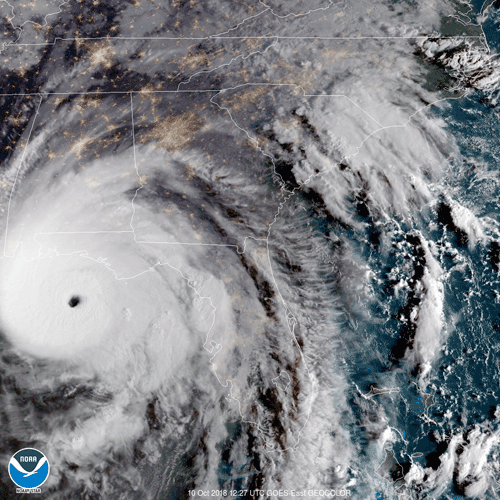Individualists are less likely to obey hurricane evacuation orders
New research on worldviews suggests that authorities may need to adjust their messages
May 26, 2020 - by David Hosansky
May 26, 2020 - by David Hosansky
Hurricanes may take erratic paths, but the response by those in harm's way often follows a predictable pattern. Even in the face of repeated warnings and many people evacuating, some residents of high-risk areas invariably discount the forecasts and refuse to take shelter.
A new study by social scientists at the National Center for Atmospheric Research (NCAR) and the University of Washington suggests that one reason has to do with cultural worldviews.
People with strongly individualist worldviews tend to be less trustful of authorities and less likely to be persuaded by official predictions of risk, the study finds. In contrast, people with egalitarian worldviews tend to be more concerned about environmental risks.
"Previous studies have found that people with individualist worldviews tend to perceive longer-term environmental issues such as climate change as less risky," said NCAR scientist Rebecca Morss, the lead author of the new study. "We found that people with stronger individualist worldviews also perceive lower risks from near-term threats posed by an approaching hurricane."
Morss and her co-authors suggest that those in official positions may need to adjust their messages or rely on other messengers to reach residents who are less inclined to heed their warnings about hurricanes.
The new study, which used data from a survey of residents in hurricane-prone areas, was published in the Journal of Risk Research. It was funded by the National Science Foundation, NCAR's sponsor.
Social scientists for years have studied why certain people are more resistant than others to warnings about hurricanes, tornadoes, and other natural hazards. They've looked at factors such as gender, income, risk perception, and past experiences with natural disasters, but none of these provides a full picture of why some people decide to obey evacuation orders or take other recommended precautions while others do not.
Morss and her co-authors decided to see if cultural worldviews could help provide a more complete answer. Social scientists have previously found that worldviews can shape perceptions of long-term risk in a variety of contexts, from drought to climate change to gun ownership. But they had not previously applied the cultural theory of risk to a short-term event, such as an approaching storm.

To test the relevance of cultural worldviews, the study team surveyed more than 200 residents in two of the highest-risk hurricane evacuation zones in the Miami area. The surveys, in both English and Spanish, asked residents about their level of concern if a Category 4 hurricane was headed toward Miami, whether they would trust information about the hurricane, and whether they believed that evacuating would help them avoid injury or death.
The surveys also posed questions to probe cultural worldviews, asking respondents if they agreed or disagreed with statements such as "I support government programs to get rid of poverty" and "The government interferes too much in our everyday lives." In addition, respondents were asked if they considered themselves politically liberal or conservative.
The results indicate that cultural worldviews are significantly correlated with decisions about evacuations. Respondents with stronger individualist worldviews said that they were about 25% less likely to evacuate. They also expressed less concern about the hurricane’s risk, more doubt that local and federal officials were well prepared for a hurricane, and less trust in information from public officials and the media.
“People are cultural beings," said NCAR scientist Heather Lazrus, a co-author. "Our various cultural worldviews help us identify and respond to risks that threaten how we believe the world should be organized. We maintain our worldviews even in the face of an imminent threat."
Morss added: "If you know someone's cultural worldview, that gives you foundational knowledge for understanding how they are likely to respond to different kinds of information."
Although it may be frustrating to authorities when residents do not heed warnings, the study concludes that changing the wording of messages or delivering them in a variety of ways may help motivate more people to respond.
"Some people only need one message, and they trust the authorities and they follow the official guidance," Morss said. "For other people, they need to hear about the risk a number of times, perhaps in different ways or from different sources, or to see it for themselves. If you adjust your messaging, that can help people hear the information so they can make an informed decision.”